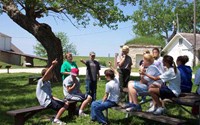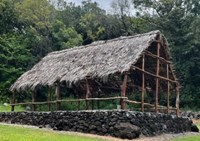- Lesson Plan (118)
- Field Trips (35)
- Distance Learning (31)
- Student Activities (16)
- Other Education Materials (5)
- Teacher Reference Materials (5)
- Field Schools & Institutes (3)
- Guest Speakers (3)
- Media for Loan (2)
- Traveling Trunk (2)
- Primary Sources (1)
- Science Labs (1)
- Teacher Workshops & Other Programs (1)
- Acadia National Park (9)
- Haleakalā National Park (9)
- Shenandoah National Park (7)
- Everglades National Park (6)
- Glacier National Park (6)
- Olympic National Park (6)
- Lowell National Historical Park (5)
- New Orleans Jazz National Historical Park (5)
- Abraham Lincoln Birthplace National Historical Park (4)
- Show More ...
- Science (141)
- Social Studies (113)
- Literacy and Language Arts (50)
- Math (26)
Showing 216 results for Environmental Law ...
Adapting to an Extreme Environment
LBJ and the Environment of the 1960s
"Create a Community" Environment: 4-6th Grade
Law Merit Badge
- Type: Other Education Materials
- Grade Levels: Middle School: Sixth Grade through Eighth Grade
Does protecting the law involve bravery? Does telling the truth equal courage? Investigate the judicial system and its important role in our society. Scouts re-enact a historic trial and debate contemporary issues. An attorney and a National Park Service Law Enforcement Ranger will discuss their roles and responsibilities in society.
Exploring Humanitarian Law
"What's So Special?" Environment: 4-6 Grade
- Type: Lesson Plan
- Grade Levels: Upper Elementary: Third Grade through Fifth Grade
Students will draw a favorite plant, animal, or activity common to the Everglades environment and explain, in writing, the reason they chose it. This will help students recognize and identify one valuable aspect of a national park’s environment, and draw conclusions as to why they value that aspect of the environment.
"Incredible Shrinking Habitat" Environment: 4-6 Grade
- Type: Lesson Plan
- Grade Levels: Upper Elementary: Third Grade through Fifth Grade
The Florida panther has succumbed to numerous pressures, including loss of habitat, to become a highly endangered species. Access into wilderness areas by road building for drainage canals, and increased development for ranching, lumber, agriculture, mining, oil and gas drilling, housing and recreation all impact the panther habitat. Students will become panthers, deer and vehicles in an active tag-like game to learn about the impact of development.
Building Stewardship Through Science - Mercury in Our Environment
- Type: Field Trips
- Grade Levels: High School: Ninth Grade through Twelfth Grade
By working with various partners, including Dartmouth College's Toxic Metals Research Program, students determine mercury levels in macroinvertebrates taken from the Pogue (pond) in Marsh-Billings-Rockefeller NHP. Students learn how mercury moves through air, water, and through the food chain. By reading Marsh, learning about Billings and Rockefeller, students will cultivate a sense of stewardship and reflect on their own choices.
Environmental Prairie Science
Enviro Musical Chairs
- Type: Lesson Plan
- Grade Levels: Middle School: Sixth Grade through Eighth Grade
There's a certain mystique about the word “biodiversity” that seems to be associated with images of steamy jungles or wondrous new medicines, but the word more specifically refers to the number of species or 'species richness' of an area. One reason why tropical areas are so fascinating is that they contain the highest numbers of plant and animal species found anywhere on earth.American Samoa sits squarely in the tropics, so we should have a high biological diversity here, but we do and we don't
LBJ's Environmental Legacy
- Type: Lesson Plan
- Grade Levels: Middle School: Sixth Grade through Eighth Grade
Begin to build in LBJ's environmental legacy into your curriculum by using resources provided
"Where Have You Gone?" Environment: 4-6 Grade
- Type: Student Activities
- Grade Levels: Upper Elementary: Third Grade through Fifth Grade
Students will be able to: a) discuss some of the problems that wild animals and plants face from humans, b) list examples of how personal feelings and beliefs can affect situations involving wild organisms, and c) make decisions about a value-related plant/animal issue.
Klondike's Environmental Impact on People
- Type: Lesson Plan
- Grade Levels: Upper Elementary: Third Grade through Fifth Grade
What situations were travelers to the Klondike Gold Rush prepared to handle? Are there any bugs or animals that could have caused them harm? Do you think the small chance of finding gold successfully outweighed the risks and costs of sailing and hiking into the Yukon?
He Aha Lā He Kūkulu?
FDR’s New Deal Environmental Preservation
- Type: Lesson Plan
- Grade Levels: High School: Ninth Grade through Twelfth Grade
Students will be able to argue by using multiple sources the effectiveness of FDR’s Relief, Recovery and Reform Programs toward environmental preservation.
Law and Order: Does the punishment fit the crime?
- Type: Lesson Plan
- Grade Levels: Upper Elementary: Third Grade through Fifth Grade
At the end of this activity, the student will be able to: -Summarize the establishment of state and national governments. -Explain the structure and function of the legislative, executive, and judicial branches of the federal government.
Segregation Laws in the 1800s: Williams v. Bellefontaine
- Type: Field Trips
- Grade Levels: Upper Elementary: Third Grade through Fifth Grade
In 1867, Neptune and Caroline Williams sued the Bellefontaine Railway Company over its discriminatory policies regarding African Americans. In a dispute with the streetcar operator, Mrs. Williams was hurt. The Williamses sued at the St. Louis Courthouse and won their case, but with a twist. Will students reach the same verdict?
The Wirz Trial: A Mock Trial Lesson Plan Examining the Laws of War
A Town Divided
- Type: Lesson Plan
- Grade Levels: Upper Elementary: Third Grade through Fifth Grade
We live in a nation of laws. Our rights are protected by the Constitution. There are national laws, state or territorial laws, and local laws that exist to protect those rights. What happens when laws are passed that restrict those rights? What then? What happens when those in power choose which laws to enforce and who to administer justice to?















